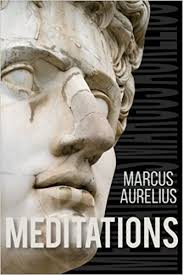Meditations Page #17
Meditations is a series of personal writings by Marcus Aurelius, Roman Emperor from 161 to 180 AD, recording his private notes to himself and ideas on Stoic philosophy. Marcus Aurelius wrote the 12 books of the Meditations in Koine Greek as a source for his own guidance and self-improvement.
XLIII. Let thy course ever be the most compendious way. The most compendious, is that which is according to nature: that is, in all both words and deeds, ever to follow that which is most sound and perfect. For such a resolution will free a man from all trouble, strife, dissembling, and ostentation. THE FIFTH BOOK I. In the morning when thou findest thyself unwilling to rise, consider with thyself presently, it is to go about a man's work that I am stirred up. Am I then yet unwilling to go about that, for which I myself was born and brought forth into this world? Or was I made for this, to lay me down, and make much of myself in a warm bed? 'O but this is pleasing.' And was it then for this that thou wert born, that thou mightest enjoy pleasure? Was it not in very truth for this, that thou mightest always be busy and in action? Seest thou not how all things in the world besides, how every tree md plant, how sparrows and ants, spiders and bees: how all in their kind are intent as it were orderly to perform whatsoever (towards the preservation of this orderly universe) naturally doth become and belong unto thin? And wilt not thou do that, which belongs unto a man to do? Wilt not thou run to do that, which thy nature doth require? 'But thou must have some rest.' Yes, thou must. Nature hath of that also, as well as of eating and drinking, allowed thee a certain stint. But thou guest beyond thy stint, and beyond that which would suffice, and in matter of action, there thou comest short of that which thou mayest. It must needs be therefore, that thou dost not love thyself, for if thou didst, thou wouldst also love thy nature, and that which thy nature doth propose unto herself as her end. Others, as many as take pleasure in their trade and profession, can even pine themselves at their works, and neglect their bodies and their food for it; and doest thou less honour thy nature, than an ordinary mechanic his trade; or a good dancer his art? than a covetous man his silver, and vainglorious man applause? These to whatsoever they take an affection, can be content to want their meat and sleep, to further that every one which he affects: and shall actions tending to the common good of human society, seem more vile unto thee, or worthy of less respect and intention? II. How easy a thing is it for a man to put off from him all turbulent adventitious imaginations, and presently to be in perfect rest and tranquillity! III. Think thyself fit and worthy to speak, or to do anything that is according to nature, and let not the reproach, or report of some that may ensue upon it, ever deter thee. If it be right and honest to be spoken or done, undervalue not thyself so much, as to be discouraged from it. As for them, they have their own rational over-ruling part, and their own proper inclination: which thou must not stand and look about to take notice of, but go on straight, whither both thine own particular, and the common nature do lead thee; and the way of both these, is but one. IV. I continue my course by actions according to nature, until I fall and cease, breathing out my last breath into that air, by which continually breathed in I did live; and falling upon that earth, out of whose gifts and fruits my father gathered his seed, my mother her blood, and my nurse her milk, out of which for so many years I have been provided, both of meat and drink. And lastly, which beareth me that tread upon it, and beareth with me that so many ways do abuse it, or so freely make use of it, so many ways to so many ends. V. No man can admire thee for thy sharp acute language, such is thy natural disability that way. Be it so: yet there be many other good things, for the want of which thou canst not plead the want or natural ability. Let them be seen in thee, which depend wholly from thee; sincerity, gravity, laboriousness, contempt of pleasures; be not querulous, be Content with little, be kind, be free; avoid all superfluity, all vain prattling; be magnanimous. Doest not thou perceive, how many things there be, which notwithstanding any pretence of natural indisposition and unfitness, thou mightest have performed and exhibited, and yet still thou doest voluntarily continue drooping downwards? Or wilt thou say that it is through defect of thy natural constitution, that thou art constrained to murmur, to be base and wretched to flatter; now to accuse, and now to please, and pacify thy body: to be vainglorious, to be so giddy-headed., and unsettled in thy thoughts? nay (witnesses be the Gods) of all these thou mightest have been rid long ago: only, this thou must have been contented with, to have borne the blame of one that is somewhat slow and dull, wherein thou must so exercise thyself, as one who neither doth much take to heart this his natural defect, nor yet pleaseth himself in it. VI. Such there be, who when they have done a good turn to any, are ready to set them on the score for it, and to require retaliation. Others there be, who though they stand not upon retaliation, to require any, yet they think with themselves nevertheless, that such a one is their debtor, and they know as their word is what they have done. Others again there be, who when they have done any such thing, do not so much as know what they have done; but are like unto the vine, which beareth her grapes, and when once she hath borne her own proper fruit, is contented and seeks for no further recompense. As a horse after a race, and a hunting dog when he hath hunted, and a bee when she hath made her honey, look not for applause and commendation; so neither doth that man that rightly doth understand his own nature when he hath done a good turn: but from one doth proceed to do another, even as the vine after she hath once borne fruit in her own proper season, is ready for another time. Thou therefore must be one of them, who what they do, barely do it without any further thought, and are in a manner insensible of what they do. 'Nay but,' will some reply perchance, 'this very thing a rational man is bound unto, to understand what it is, that he doeth.' For it is the property, say they, of one that is naturally sociable, to be sensible, that he doth operate sociably: nay, and to desire, that the party him self that is sociably dealt with, should be sensible of it too. I answer, That which thou sayest is true indeed, but the true meaning of that which is said, thou dost not understand. And therefore art thou one of those first, whom I mentioned. For they also are led by a probable appearance of reason. But if thou dost desire to understand truly what it is that is said, fear not that thou shalt therefore give over any sociable action.
Translation
Translate and read this book in other languages:
Select another language:
- - Select -
- 简体中文 (Chinese - Simplified)
- 繁體中文 (Chinese - Traditional)
- Español (Spanish)
- Esperanto (Esperanto)
- 日本語 (Japanese)
- Português (Portuguese)
- Deutsch (German)
- العربية (Arabic)
- Français (French)
- Русский (Russian)
- ಕನ್ನಡ (Kannada)
- 한국어 (Korean)
- עברית (Hebrew)
- Gaeilge (Irish)
- Українська (Ukrainian)
- اردو (Urdu)
- Magyar (Hungarian)
- मानक हिन्दी (Hindi)
- Indonesia (Indonesian)
- Italiano (Italian)
- தமிழ் (Tamil)
- Türkçe (Turkish)
- తెలుగు (Telugu)
- ภาษาไทย (Thai)
- Tiếng Việt (Vietnamese)
- Čeština (Czech)
- Polski (Polish)
- Bahasa Indonesia (Indonesian)
- Românește (Romanian)
- Nederlands (Dutch)
- Ελληνικά (Greek)
- Latinum (Latin)
- Svenska (Swedish)
- Dansk (Danish)
- Suomi (Finnish)
- فارسی (Persian)
- ייִדיש (Yiddish)
- հայերեն (Armenian)
- Norsk (Norwegian)
- English (English)
Citation
Use the citation below to add this book to your bibliography:
Style:MLAChicagoAPA
"Meditations Books." Literature.com. STANDS4 LLC, 2025. Web. 24 Feb. 2025. <https://www.literature.com/book/meditations_76>.








Discuss this Meditations book with the community:
Report Comment
We're doing our best to make sure our content is useful, accurate and safe.
If by any chance you spot an inappropriate comment while navigating through our website please use this form to let us know, and we'll take care of it shortly.
Attachment
You need to be logged in to favorite.
Log In